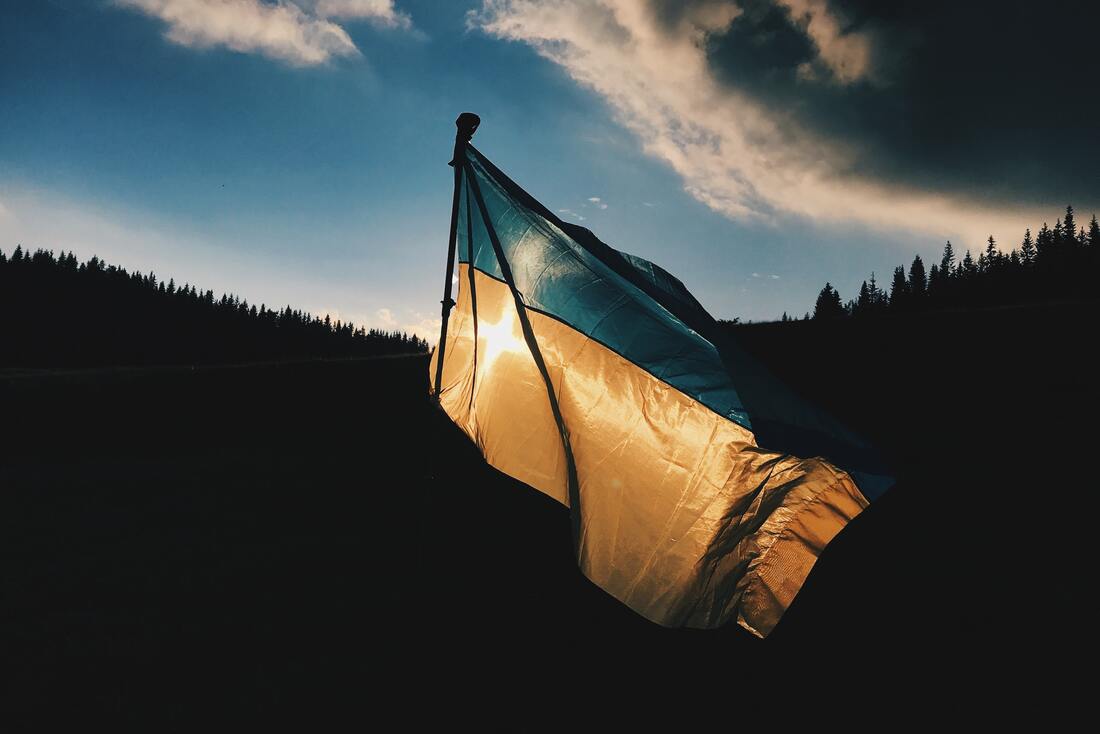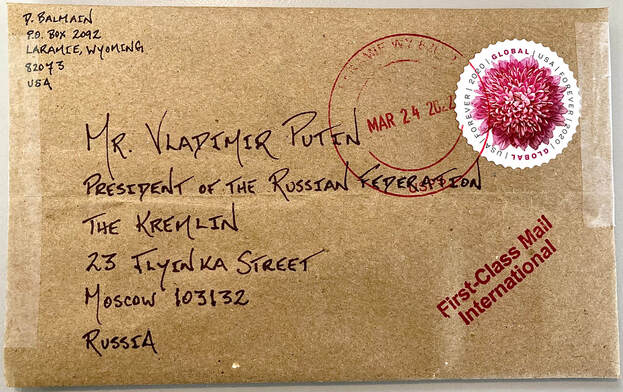War & Oneness:
A Unified Perspective of the War in Ukraine
04.06.2022
The war in Ukraine has been reminding us all of how small this planet we share is. Modern warfare is not localized. There can be no isolated incident in our current reality of global economics, connectivity, and thermonuclear capability.
Many of us, myself included, are uncertain about how this war relates to us and our role within it. We see the suffering, we feel the suffering, but what is our relationship to it? What is our responsibility to it?
It is inevitable that war and conflict create contradiction and confusion. How can we rejoice in the killing of the enemy and simultaneously mourn loss of life? How do we reconcile selfish impulses alongside our loyalties to what exists beyond ourselves? How do we understand our desire for peace alongside our proclivity for violence?
These questions have reminded me of the Bhagavad Gita, the ancient spiritual dialogue between Prince Arjuna and his charioteer Lord Krishna. Krishna, who is understood as being the “Supreme Personality of the Godhead,” gives counsel to Arjuna as he experiences the profound ethical dilemmas of being confronted with war.
The war in Ukraine has been reminding us all of how small this planet we share is. Modern warfare is not localized. There can be no isolated incident in our current reality of global economics, connectivity, and thermonuclear capability.
Many of us, myself included, are uncertain about how this war relates to us and our role within it. We see the suffering, we feel the suffering, but what is our relationship to it? What is our responsibility to it?
It is inevitable that war and conflict create contradiction and confusion. How can we rejoice in the killing of the enemy and simultaneously mourn loss of life? How do we reconcile selfish impulses alongside our loyalties to what exists beyond ourselves? How do we understand our desire for peace alongside our proclivity for violence?
These questions have reminded me of the Bhagavad Gita, the ancient spiritual dialogue between Prince Arjuna and his charioteer Lord Krishna. Krishna, who is understood as being the “Supreme Personality of the Godhead,” gives counsel to Arjuna as he experiences the profound ethical dilemmas of being confronted with war.
|
Prince Arjuna
You lick at the worlds around you, devouring them with flaming mouths; and your terrible fires scorch the entire universe, filling it, [Krishna], with violent rays. Tell me-- who are you in this terrible form? […] (Bhagavad Gita. Chapter 11. Paragraphs 30-31.) |
The deities of ancient eastern thought and religion are not deities in a western, monotheistic sense. In this context, the divine in Lord Krishna is the divine in all of us. The incomprehensibility of Krishna exists in his everythingness. In the context of the Gita’s teachings, Krisha is pushing us to embrace the oneness of all things by virtue of common being and common origin.
The value in these teachings is in recognizing that each one of us contain all things at all times. Our capacity for violence and non-violence, our capacity for love and hate, our enemies and our allies—all are of-and-from a single origin. There is no escaping our fundamental connectedness.
|
Lord Krishna
I am death the destroyer of all, the source of what will be, the feminine powers: fame, fortune, speech, memory, intelligence, resolve, patience. I am the great ritual chant, the meter of sacred song, the most sacred month in the year, the spring blooming with flowers. (Bhagavad Gita. Chapter 10. Paragraphs 34, 35.) |
The work we must do, if we wish to help end this conflict and create a better world, is the work of seeing ourselves within our enemies. We cannot address the terror and violence that exists outside of ourselves until we learn to face the terror and violence that exists within ourselves.
Two weeks ago, I wrote the following open-letter to Vladimir Putin:
|
March 24th, 2022 Vladimir Putin President of the Russian Federation The Kremlin 23 Ilyinka Street Moscow 103132 Russia Dear Putin, Lost brother. You’ve done a good job of deceiving yourself, but I still see you, as do many others. I feel the suffering within you as I feel it within those who you are harming, just as I feel it within myself. The suffering of the individual is inseparable from the suffering of the Whole. Isn’t it a cruel and beautiful joke that the more powerful we become, the more vulnerable we are made? Yet the more we accept our vulnerabilities, the more invulnerable we become? Do you remember learning of the samurai warriors during Japan’s period of divided clans and civil wars? Each house was competing for dominance and each further diminishing itself by virtue of its own ambitions. Do you remember learning—after all the waring, after all the bloodshed and loss of life—that the samurai warriors forfeited their most precious lands and temples to the pacifist Zen monks because the samurai failed to subjugate them with their threats of death? Have you imagined getting all that you think you want alongside the visualization of your own death? Have you considered how significant you will feel your desires to be when you can no longer take in food or water? What will all of the world’s oil reserves, all of the world’s weaponry, all of the world’s material wealth be worth to you when you confront your own impermanence? I see you Vlad. I see you because I see myself. You did not become lost on your own. You were made lost by the artificial and superficial realities that we have constructed for ourselves through our industrialist nations. I still see, and still know, the small boy who wanted love and happiness but lost himself to the world’s circumstances. I know the boy who felt fear and hurt, who hardened his heart and receded into his own conscious delusion, who made a playing field of life and vowed never to be beaten again. But don’t you remember, Vlad, how easy it is to win? How easy it is to simply stand up from the game? Isn’t that the trick—the loophole—that conceals itself in its own obviousness? Do you beat the casino by putting your money up against theirs? No. The way to win, is not to play. Let these people go, Vlad. Let yourself go. Allow for your vulnerabilities and become invulnerable. Relinquish your will-to-power and become free. Allow your own suffering to meld with the suffering you’ve inflicted so the world may begin healing. Admit to your mistakes and accept your punishments for the atrocities that you have committed with an open heart. Do not worry about how or when you will die. Live the remainder of your life truthfully and with openness and it won’t matter. Your estranged brother, Douglas Balmain |
In the same breath, I sent messages to the Ukrainian Ministry of Defense and other elements of the Ukrainian effort wishing them all the best in the defense of their country. I expressed to them my feeling that the suffering inflicted upon the people of Ukraine by this war of Russian aggression is being felt and shared by all. I then told them I wished to dedicate an old song of mine, The Hole You Dug, to their war effort. Despite its darkness, I told them that I hope its words will give some added encouragement.
|
The Hole You Dug
Mind your step, watch your feet. You're gonna fall in the hole you dug for me. I'll cover you with earth and let you sleep. Cut your teeth, got a lot to chew. Grow some feet to fill those boots. No comin' back… Where you're headed to. Mind your step, watch your feet. You're gonna fall in the hole you dug for me. I'll cover you with earth and let you sleep. A deep, dull thud, you lost your feet. Take more care to cross your t's When there's a shovel in your hand… A shovel in your hand… Meant for me. Mind your step, watch your feet. You're gonna fall in the hole you dug for me. I'll cover you with earth and let you sleep. Mind your step Watch your feet, You’re gonna fall in the hole, You dug, you dug for me… Mind your step, watch your feet. You're gonna fall in the hole you dug for me. I'll cover you with earth… I’ll cover you with earth, and let you sleep. (Listen: https://youtu.be/mfJDvFZykks) |
How can I gift oneness and empathy in one hand while passing a blade in the other? How can I wish for peace and bless violence? How do we reconcile these contradictions?
The awareness and recognition of oneness does not mean a mad dog ought not be put down. It means we have the responsibility of not becoming mad dogs ourselves in the act of putting them down.
|
Lord Krishna
I am time grown old, creating world destruction, set in motion to annihilate the worlds; even without you, all these warriors arrayed in hostile ranks will cease to exist. … Do not tremble or suffer confusion from seeing my horrific form; your fear dispelled, your mind full of love, see my form again as it was. ... By devotion alone can I, as I really am, be known and seen and entered into, Arjuna. Acting only for me, intent on me, free from attachment, hostile to no creature, Arjuna, a man of devotion comes to me. (Bhagavad Gita. Chapter 11. Paragraphs 32, 49, 54, 55.) |
These fragments encapsulate the great challenge that is ours both individually and collectively. Namely, it is the challenge of gaining perspective. We cannot protect those who we care about, we cannot preserve this world’s beauty, we cannot maintain our sense of wonderment in experiencing this Universe, we cannot be ambassadors of peace and compassion if we turn away from horror and atrocity in blind condemnation.
As this war continues on, our task is to see all—to maintain honest and holistic perspectives—without curating our view. Our work, across the globe, is to demonstrate the discipline, fortitude, and openness required to realize that the suffering of our friends and the suffering of our enemies exist together, as one.


